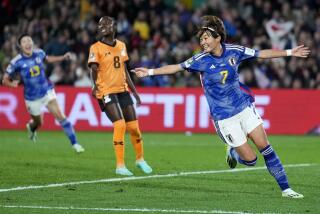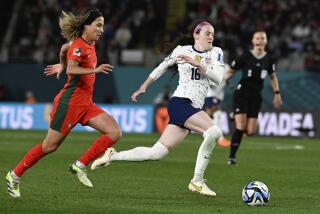It’s England-Scotland, so Watch Out
LONDON — England and Scotland, the rose and the thistle, are neighbors in the same kingdom. But when it comes to soccer, forget brotherhood. Think instead of flashing swords and screaming blue-painted faces.
Scots and English celebrate their first soccer encounter in seven years at London’s Wembley Stadium this afternoon as the dramatic--and potentially violent--centerpiece of Euro 96, a 16-nation soccer extravaganza to crown a continental champion.
Euro 96 is a usual-suspects showdown, on the field and in the stands. No one would be surprised if the championship matches Italy against Germany, but France and the Netherlands are also potential finalists.
Some of the world’s best players are here. And some of the most determined hooligans since Attila. An army of 10,000 police armed with helicopters, dogs, surveillance cameras, decades of experience and five specially prepared jails await them.
History lends nervousness to today’s game, but midway through first-round play, a festival that opened June 8 is all upbeat: exciting play, few arrests, no violence.
The 31-match tournament, which ends June 30, showcases the best professional soccer north of the Rio Grande, with four divisions playing in eight English cities. More than a million spectators and a broadcast audience of billions in 194 countries make Euro 96 the third-largest sports event in the world, after the Summer Olympics and the World Cup.
Off the field, Euro 96, the biggest sporting event in England in 30 years, is Europe’s “Welcome Back” to English soccer after a dark age punctuated by decadence and violence.
For three years in the ‘80s, English teams were banned from international soccer because of run-amok ruffians. In 1985, English hoodlums started a stampede in which 39 fans, most of them Italian, died at a championship match in Belgium; at home, 95 fans died in a crush at Sheffield in 1989. Dozens more died when fire swept a stadium at Bradford.
A ‘90s renaissance has dramatically changed the face and the image of English soccer: Remodeled, all-seats stadiums have begun to attract more affluent crowds to what has been a working-class game since soccer was first codified here in 1863. The best English players still go abroad and no-risk soccer is still fashionable, but the quality of Premier League play has improved with a leavening of imported tactics and international players.
The big questions as 76,000 partisans gather at Wembley today is whether the English and the Scots can contain their love-hate rivalry to boisterousness. In 1989, the last time Scotland and England met, fighting in the stands forced abandonment of the century-old series.
Neither Scotland nor England is among the tournament favorites, and the loser today will probably not make the quarterfinals.
Analysts portray the match as a test between English strength and Scottish passion. England, the more skilled team, seemed listless and tired in an opening 1-1 draw with lackluster Switzerland last Saturday.
“I’m trying to get them to stick their chests out and play like men so they have to be treated like men,” said English Coach Terry Venables, defending his decision to give his team a night out after the Switzerland game.
As tensions mounted, though, players began snapping at jostling hordes of journalists and Venables cried “Traitors!” at critical reporters.
Scotland, one of the weakest Euro 96 teams, won a moral victory in a 0-0 opening tie against the Netherlands and kept alive the dream of advancing.
Scottish Coach Craig Brown was unimpressed when bookies lowered Scotland’s odds from 80-1 to 66-1. Brown welcomes the underdog role.
“I’d like to think Terry will be worried about how we will play. All the pressure is on them,” he said.
A 2-0 Dutch victory Thursday over Switzerland virtually assures their promotion and weighs on England, which plays the Netherlands next Tuesday to complete Group A play.
With the number of teams doubled to 16 this year for the first time, the top two finishers in each group will advance to the quarterfinals beginning June 22.
France, which has not lost in its last 24 international matches, including a 1-0 Euro 96 victory over Romania, is the class of Group B. The French play today against Spain, which tied its opener against Bulgaria. The Bulgarians, 1-0 winners over Romania, are well-placed to advance if the French win today.
Group C is known to its four strong members as “the group of death.” Even the weaker teams can sting. Germany defeated the Czech Republic, 2-0, in its opener and plays Russia on Sunday. Italy defeated Russia, 2-0, in its first game, but lost to the Czechs, 2-1, on Friday.
In Group D, crowd-pleasing, attack-happy Portugal tied defending champion Denmark, 1-1, and Friday defeated Turkey, 1-0. Croatia arrived as a dark horse some critics thought could go all the way and narrowly won, 1-0, against outsider Turkey. Croatia and Denmark play Sunday.
Sunday may be a long time coming, though. What happens today between England and Scotland--on the field and in the stands--will go far in determining how Euro 96 is remembered.






